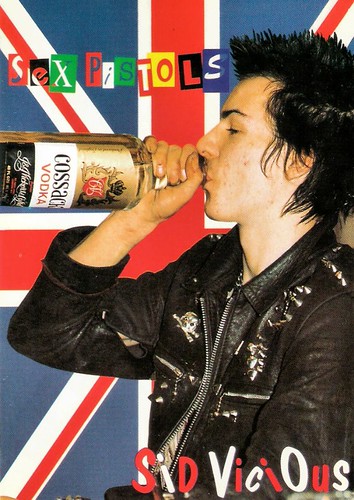
French postcard, no. 1596.
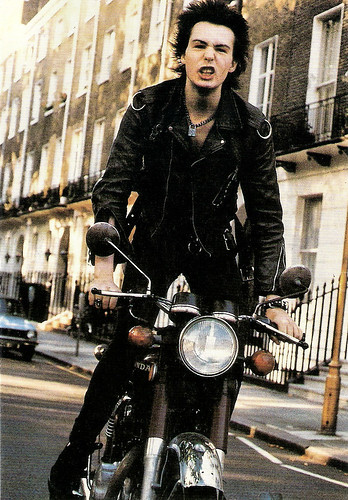
French postcard, no. C 329.
The punk spirit of anarchy and rebellion
Sid Vicious was born John Simon Ritchie, later named John Beverley in Lewisham, South East London, in 1957. His parents were John and Anne Ritchie (née McDonald). His mother dropped out of school early due to a lack of academic success and went on to join the RAF, where she met her husband-to-be, Ritchie's father. He was a guardsman at Buckingham Palace and a semi-professional trombone player on the London Jazz scene.
Shortly after Ritchie's birth, he and his mother moved to Ibiza, where they expected to be joined by his father who, it was planned, would support them financially in the meantime. However, after the first few cheques failed to arrive, Anne realized he would not be coming. In 1965, Anne later married Christopher Beverley, a middle class man, before setting up a family home back in Kent.
Ritchie took his stepfather's surname and was known as John Beverley. Ritchie's stepfather died six months later from cancer, and by 1968 he and his mother were living in a rented flat in Tunbridge Wells, where he attended Sandown Court School. In 1971, the pair moved to Hackney in East-London.
Ritchie first met John Lydon in 1973, when they were both students at Hackney Technical College. By age 17, Ritchie dropped out of school. Hanging around London, he was one of the many disaffected youth to embrace the punk spirit of anarchy and rebellion. One favourite spot was Malcolm McLaren and Vivienne Westwood's then-little-known clothing store, SEX.
John Lydon nicknamed Ritchie ‘Sid Vicious’, after Lydon's pet hamster, Sid. The hamster had bitten Ritchie, who said: "Sid is really vicious!". Another version was that Vicious referred to the famous song by 'rock 'n' roll animal' Lou Reed.
In 1976, Vicious began his musical career as a member of The Flowers of Romance with Keith Levene (who later co-founded Public Image Limited) and Palmolive and Viv Albertine, who would later form The Slits. He also appeared with Siouxsie and the Banshees.
According to Wikipedia, he also appeared as a wild fan in the short film Sex Pistols Number One (Derek Jarman, 1976) with footage of the Pistols when they did a gig at a Valentine’s Day party. Vicious stood out with his Swastika T-shirts, his spiky hair and his 'shock and destroy' attitude.
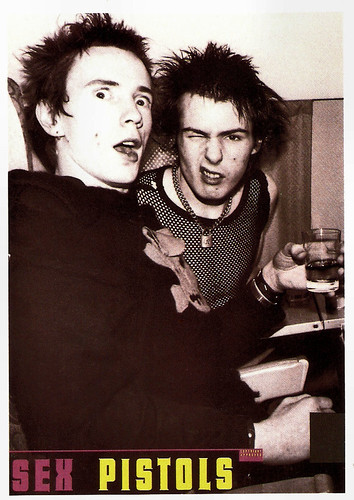
With John Lydon a.k.a. Johnny Rotten. British postcard by Oliver Books Ltd., no. 1.
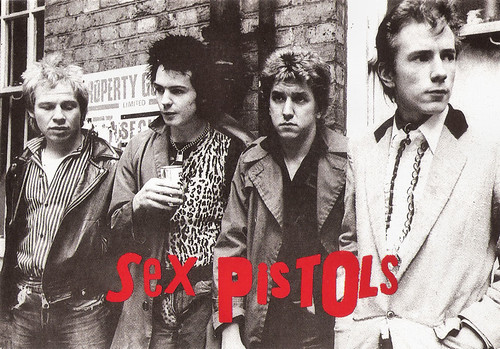
French postcard by Underground, no. U42.
One of the leading forces in punk music
In February 1977, Sid Vicious joined the Sex Pistols, to replace Glen Matlock, who had fallen out of favour with the rest of the group. Malcolm McLaren had created the Sex Pistols in 1975. One of the leading forces in punk music, the band played fast-paced short songs, expressing angst and frustration about the social and political conditions of the time.
Vicious’ ‘punk’ look had captured the eye of McLaren. Sid played his first gig with the Pistols on 3 April 1977 at The Screen On The Green in London. His debut was filmed and appears in Punk Rock Movie (Don Letts, 1979). The only trouble was that Sid could not play very well and had no bass guitar experience, so guitarist Steve Jones had to step in on bass duties for the bands' debut album Never Mind the Bollocks, Here's the Sex Pistols.
Another reason for his absence for their only studio album is that Vicious was in hospital with hepatitis, due to intravenous drug use. During that period his main visitor was his girlfriend Nancy Spungen, an American groupie and heroin addict. Never Mind the Bollocks went to No. 1 in the British album charts, and the single God Save the Queen reached No. 2. At the end of 1977, the Sex Pistols were one of the most famous bands on the planet with vulgarity and obnoxiousness as well as Sid's hardcore punk personality as the key to their stature.
Spungen and Vicious entered a destructive co-dependent relationship based on drug use. In January, 1978 the group embarked on a US tour which would only last one to two weeks because of multiple show cancellations and deterioration within the group. After the show at Winterland in San Francisco, the group fell apart, and Sid was free to do as he pleased. He recorded lead vocals on three cover songs for the soundtrack of The Great Rock 'n' Roll Swindle.
The Great Rock n' Roll Swindle (Julien Temple, 1980) features famous Vicious footage, such his covers of Frank Sinatra’s My Way and Eddie Cochran’s Somethin' Else, along with various live Sex Pistols footage.
Mark Deming at AllMovie: “This film about the brief but eventful career of The Sex Pistols primarily focuses on McLaren, their manager, as he presents his ten-point program on how to achieve success through chaos, ineptitude, and abusing the music industry. Despite some remarkable footage of The Sex Pistols' infamous Jubilee Day performance and clips from their final concert in San Francisco, there's surprisingly little screen time devoted to the group actually performing.”
But the video of Sid’s rendition of Sinatra’s My Way is a classic. Venue is the Mecca of the chanson, the Olympia in Paris with royalty and elderly bourgeois as the audience. When the red curtain opens, Sid - white tuxedo jacket, torn pants, Doc Martens boots – walks the show stairs. The music starts playing and Sid sings 'Now the end is near / I face the final curtain' like Sinatra in agony, but then the song degenerates in hard rock' n 'roll and the vocals in wild shouting . Vicious moves ever wilder and eventually, he throws his microphone off, grabs a gun from his pants and makes a massacre the public. Vicious turns around; he makes a fuck-you gesture and trudges up the stairs.
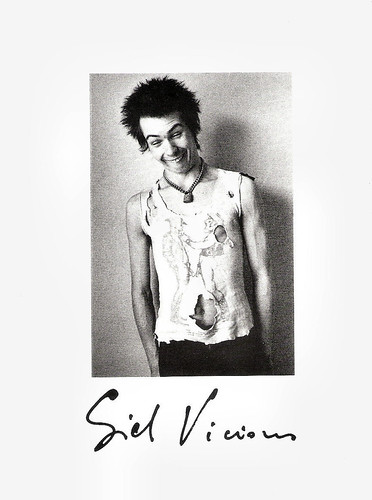
French postcard, no. 902.

British postcard by Cult Images, no. 10.
Raped, abused, attacked
With Nancy Spungen acting as his manager, Sid Vicious embarked on a solo career. Vicious performed the majority of his performances at Max's Kansas City and drew large crowds. His gigs at Max's would turn out to be his last performances. In October 1978, Spungen died from an apparent stab wound, while staying in the Hotel Chelsea, Manhattan, with Vicious.
On 22 October, ten days after Spungen's death, Vicious attempted suicide by slitting his wrist with a smashed light bulb and was subsequently hospitalized at Bellevue Hospital where he also tried killing himself by jumping from a window. Under suspicion of having committed Spungen's murder and charged with assault after attacking Todd Smith, singer Patti Smith's brother, Vicious was arrested and sent to Rikers Island metro jail for fifty-five days to undergo a painful and enforced detoxification.
It was revealed in the pilot episode of Final 24 that Sid was raped, abused, attacked and subjected to various other humiliating assaults, but no one has reported witnessing these events. He was released on bail. In celebration of his release from prison, Vicious’ mother Anne hosted a party for him. Anne had been supplying Vicious with drugs and paraphernalia since he was young, and assisted him in procuring heroin late that night.
Sid Vicious died in his sleep, having overdosed on the heroin his mother had procured. According to the book Please Kill Me: The Uncensored Oral History of Punk by Legs McNeil and Gillian McCain, Anne scattered Sid's ashes over Nancy Spungen's grave.
Nearly four weeks after Vicious' death, the soundtrack album of The Great Rock 'n' Roll Swindle was released. Later that year, on 15 December 1978, a compilation of live material recorded during his brief solo career was packaged and released as Sid Sings.
In 1986 the British film Love Kills/Sid and Nancy (Alex Cox, 1986). It, portrays the chaotic last phase of their lives, ending with a fictionalised stabbing scene. It starred Gary Oldman as Sid and Chloe Webb as Nancy. Mark Deming at AllMovie: “Sid & Nancy is less about drugs and punk rock than about a relationship. As directed by Alex Cox and enacted by Gary Oldman and Chloe Webb in performances so detailed that they're often difficult to watch, it becomes a heart-wrenching story about two people whose love is doomed from the start -- and who probably wouldn't want it any other way.”
Julien Temple made a second film about The Sex Pistols, The Filth and the Fury (Julien Temple, 2000). His The Great Rock 'n Roll Swindle (1980) was heavily criticised for being too skewed towards the Pistols' manager Malcolm McLaren's version of events. The Filth and the Fury puts the band into historical context with Britain's social situation in the 1970s through archival footage from the period. The Pistols tell their side of the story, mostly through interviews with the surviving members of the group, footage shot during the era, and outtakes from The Great Rock and Roll Swindle.
In 2006, Sid Vicious, along with the four original members of the Sex Pistols, was inducted into the Rock 'n' Roll Hall Of Fame, although the band refused to attend. The British documentary Who Killed Nancy? (Alan Parker, 2009) examines the possibility that it was not Sid Vicious who was responsible for the death of Nancy Spungen. The legend lives on.
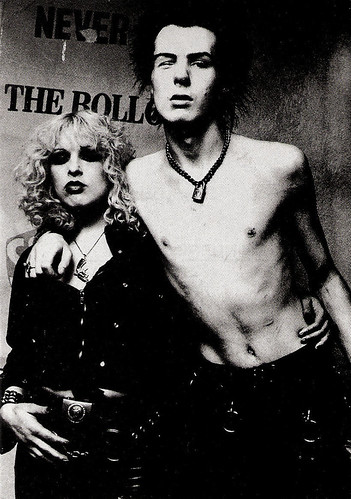
French postcard by Underground, no. 300.
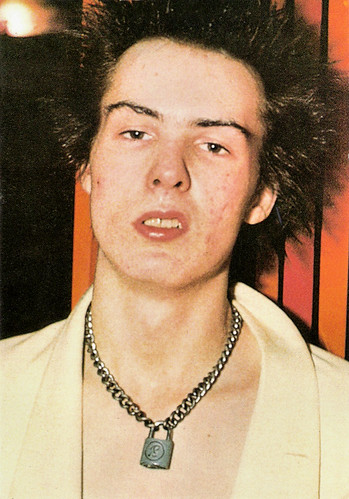
French postcard by Underground, no. 371.
Sid Vicious sings My Way. Source: Luis Asenjo (YouTube).
Trailer Sid & Nancy. Source: MovieTrailerMonkey (YouTube).
Sources: Mark Deming (AllMovie), Rowland Wymer (Derek Jarman), Pieter Steinz (NRC.nl – Dutch), Biography.com, Wikipedia, and IMDb.
No comments:
Post a Comment